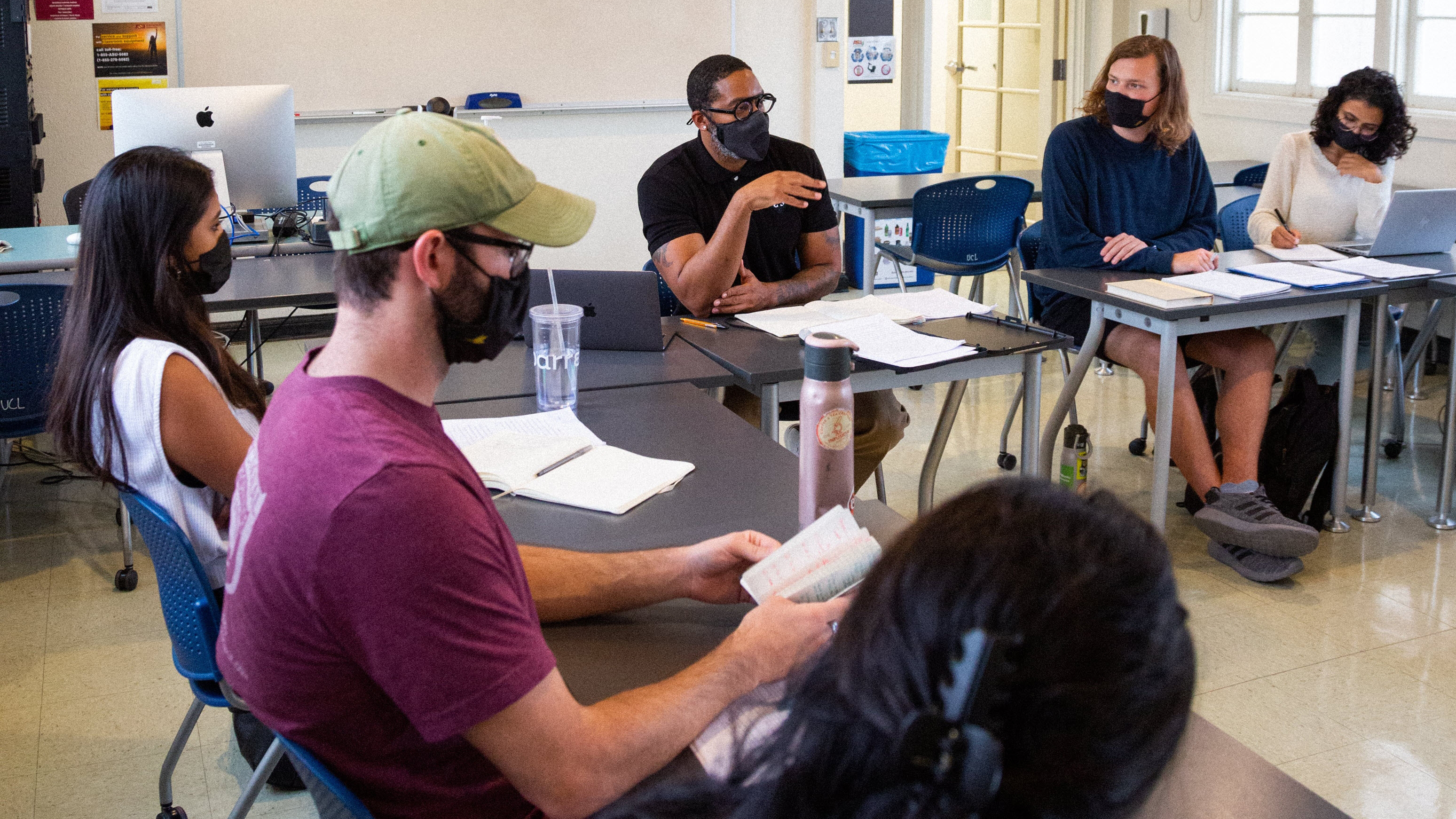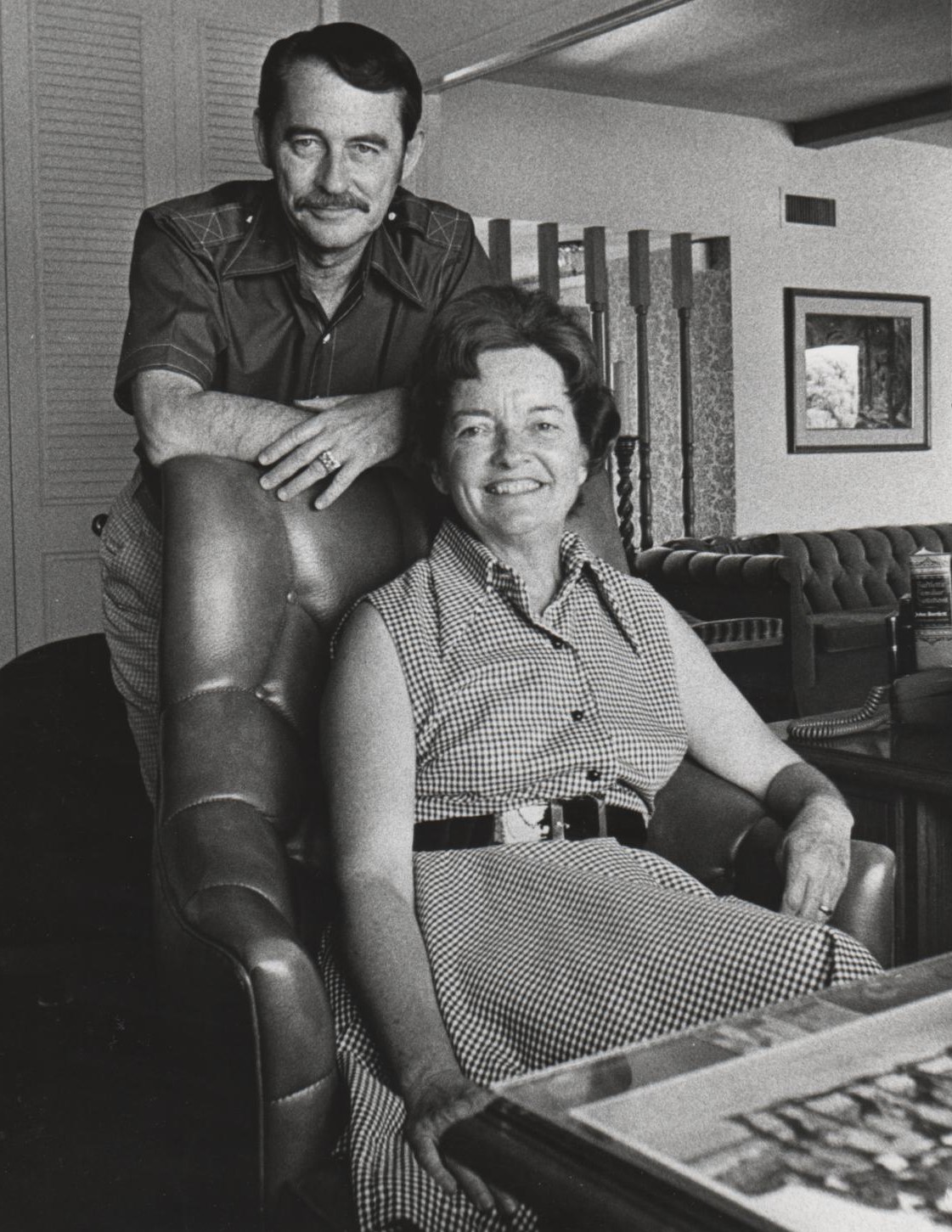A family with longtime philanthropic ties to Arizona State University has made a $1 million gift to the university’s Department of English.
The Swarthout family, whose first gift to ASU was in 1962, has created a new endowment to fund Summer Artistic Development Grants in English’s creative writing program. The grants initiate a series of three programs:
• The Glendon F. Swarthout Fellows will be six ASU undergraduates from underserved and underrepresented communities about to enter their final year of study at ASU. They will receive financial and mentoring support to apply to Master of Fine Arts in creative writing programs, including the payment of all test and admission fees, to ensure that their voices find a national stage.
• The Kathryn Blair Swarthout Fellows will be four graduating Master of Fine Arts students from ASU’s creative writing program who will be supported as they transition into their careers. Funds will cover expenses like professional development, contest and submission entry fees, manuscript review, research trips and workshops — all with the goal of enabling swift publication of their work. This fund will ensure that we launch our accomplished and diverse writers to early success.
• The Swarthout Mentorship Fellows are current Master of Fine Arts in creative writing students who will support the undergraduate fellows for six weeks over the summer through one-on-one meetings as well as group activities.
Jeffrey Cohen, dean of humanities in The College of Liberal Arts and Sciences, of which the Department of English is an academic unit, celebrated the family’s well-timed beneficence and commitment to ASU’s core values.
“This generous gift from the Swarthout family will enable a creative writing program — one of the most noted in the nation — to move to its next level while fully embracing the ASU mission of access and inclusive excellence,” he said. “The Swarthout Summer Artistic Development Grants are a game changer — and our students will benefit immensely.”
Professor of English Sally Ball, who shepherded this most recent gift as director of creative writing, said she was especially gratified about the impact on students.
“Creative writing at ASU is so lucky — especially due to the vision and commitment of Glendon and Kathryn Swarthout’s niece, Blair Vaughn-Gruler and her son Oliver Polzin — to inaugurate this additional Swarthout legacy here at ASU: one that fosters connections between the cohorts, as the graduate fellows mentor the up-and-comers, something we’re especially thrilled about,” she said.
A watershed opportunity
ASU creative writing is highly ranked among the nation’s MFA programs. Its faculty, alumni and students hold positions of leadership in the literary community and are regularly recognized with national and international honors.
Two recent Pulitzer Prize-winners include poet Natalie Diaz who further holds the Maxine and Jonathan Marshall Chair in Modern and Contemporary Poetry — a laudatory post that provides additional ASU support for a “major poet and rising star in the field of American poetry” — and novelist and essayist Mitchell Jackson, the John O. Whiteman Dean’s Distinguished Professor who is also a regular columnist for Esquire and convener of the ASU Conversations in Craft and Content series.
Professor Mitchell Jackson leads a fiction workshop during fall 2021. The ASU creative writing program prides itself on its small class sizes and close mentorship by award-winning faculty. Photo by Jenny Dupuis/ASU Academic Enterprise Communications
In addition to Diaz and Jackson, other notable and award-winning faculty in the program include fiction and nonfiction writers Matt Bell, Jenny Irish, Tara Ison (currently serving as interim director of the program), T. M. McNally (McNally himself won a Swarthout Award in the 1980s during his student years) and Sarah Viren; and poets Sally Ball, Eunsong Kim, Alberto Ríos, Solmaz Sharif and Safiya Sinclair.
A short list of alumni successes includes 2019 graduate Kalani Pickhart, who last month won the New York Public Library’s 2022 Young Lions Fiction Award for her Ukraine-set novel, “I Will Die in a Foreign Land.” The book began as Pickhart’s MFA thesis project.
Fiction writer, ASU journalism alum and current Stanford Professor Adam Johnson pointed to the support he received via the Swarthout Awards – which are open to all students at ASU, not just English majors — as fundamental to his concept of himself as a writer.
“It was my first validation that ‘this thing could happen,’” Johnson told a crowd at the ASU Desert Nights, Rising Stars Writers Conference in 2012. Johnson went on to win the Pulitzer Prize in 2013 for his novel, “The Orphan Master’s Son.” Other Swarthout Award recipients have gone on to receive fellowships from the Bread Loaf Writers Conference, Kundiman and the U.S. Fulbright Commission; and to receive awards including the Cave Canem Poetry Prize, the PEN Southwest Book Award, the Plimpton Prize, the University of Iowa Press John Simmons Award and many others; and their books have been named to "best books of the year" lists from Entertainment Weekly, NPR, the New York Times, the Wall Street Journal and more.
The Swarthout family believes the support helps create a “watershed opportunity” for emerging writers to be taken seriously. The annual awards have often functioned as a kind of springboard to students’ writing careers, providing resources — and confidence, as in Johnson’s case. The goal of the new endowment is similar: to provide a boost for talented writers as they find their footing in their writing and professional lives.
A family legacy
Glendon and Kathryn pose in the study of their Scottsdale, Arizona, home in this undated photo, which is courtesy of the Swarthout family.
Multigenerational giving defines the Swarthout family’s ASU commitment. The inaugural gift in the 1960s was made by writers Glendon and Kathryn Swarthout as a way to help young writers who are struggling financially — in the same way that Glendon was helped by an award early in his career.
Blair Vaughn-Gruler, Glendon and Kathryn Swarthout’s niece and the trustee of the Swarthout Family Trust, said she was pleased to continue this philanthropic legacy at ASU.
“The Swarthout Family Trust is honored to continue supporting ASU creative writers with a new level of financial assistance and mentorship through the Swarthout Summer Artistic Development Grants," she said.
“With the assistance of the ASU Foundation and the excellent work of ASU’s director of creative writing Sally Ball, Glendon and Kathryn Swarthout’s legacy continues to grow and evolve, offering a new layer of critical support to emerging student writers.”
Glendon Swarthout, who died in 1992, taught at ASU from 1959 to 1963. He authored 16 novels, two of which were Pulitzer Prize nominees. Nine others were made into films, including “Bless the Beasts and Children,” “The Shootist,” “Where the Boys Are” and “The Homesman.”
Kathryn Swarthout, ever the champion of her husband’s work, was a literary force in her own right. She was a columnist for Woman's Day magazine for 26 years and received a Certificate of Merit in Literature from the National Society of Arts and Letters. Together Kathryn and Glendon co-wrote six novellas for young adults, and their papers are held in ASU Library’s Rare Books and Manuscripts. Kathryn died in 2015.
The couple had a son, Miles, also a writer. His adaptation of his father’s novel “The Shootist,” which would become John Wayne’s last film, was nominated for a Writers Guild award. In addition to his work as a journalist and columnist, Miles Swarthout rekindled interest in the novels his parents co-wrote by publishing them as e-books. After his parents’ deaths, he remained actively involved in the Swarthout Awards at ASU — committed to continuing his family’s involvement into another generation — until his own passing in 2016.
This spring’s awards marked the 60th year of the contest, and they remain among the five most generous prizes in higher education. With this newest endowment, the Swarthout family is poised to make good on Glendon and Kathryn’s oft-praised “determination to make a difference.”
Top photo: Glendon Swarthout’s writing desk resides in the Piper Writers House, home of the Virginia G. Piper Center for Creative Writing at ASU. A framed poster advertising John Wayne’s last film, “The Shootist,” which was based on Swarthout’s novel, leans on the desk. Photo by Kristen LaRue-Sandler/ASU
More Arts, humanities and education

ASU course explores culture through an interdisciplinary lens
When Razieh Araghi joined Arizona State University in fall 2025, she wanted to show students the power of humanities. Her course — SLC 202 Exploring Cultures: Words, Images, Stories — aims to do…

ASU launches ‘AI-Informed Writing Classroom’
“How do I know what I think until I see what I say?”This question, attributed to novelist E.M. Forster, alludes to the role of writing in discovery and cognition.In 2026, the existence of large-…

Fluent Futures Lab teaches what English textbooks miss
Learning English is about more than mastering key vocabulary and demonstrating verb tenses — it’s about knowing what to say, how to say it and when. At Arizona State University,…




